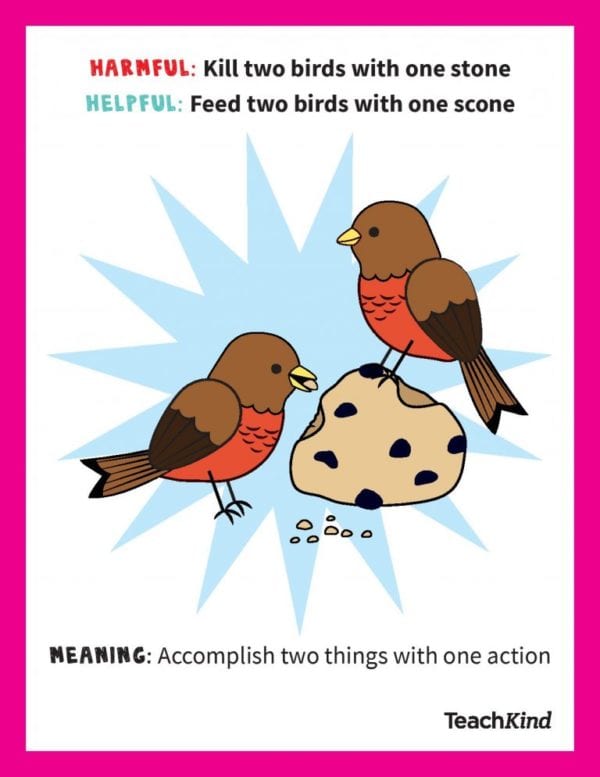
Idioms are everywhere in the English language. To most, they are playful and innocuous additions to our conversations. People for the Ethical Treatment of Animals (PETA), however, disagrees. On December 4, 2018 the group took to the internet to let English speakers know the error of their ways. The high-profile—and highly controversial—animal welfare group used their Twitter and Instagram accounts to advocate for a removal of “speciesism from… daily conversations” (PETA, 2018). “Speciesism” is the unreasonable and harmful privileging of one species—typically humans—over other species of animals. Like racism or sexism, it is a bias that PETA wants us to shun and abandon in our actions. Their campaign, however, took the new step of targeting anti-animal language in common idioms and suggested animal friendly alternatives. When knocking out tasks, one should say they were able to “feed two birds with one scone,” rather than “kill two birds with one stone.” “Take the bull by the horns” was replaced with “take the flower by the thorns,” and “more than one way to skin a cat” was replaced by “more than one way to peel a potato.” Instead of being the member of the household to “bring home the bacon,” a so-called breadwinner might “bring home the bagels” (PETA, 2018). As one Twitter user questioned, “surely [PETA] [has] bigger fish to fry than this” (Wang, 2018)?
The organization argued that “our society has worked hard to eliminate racist, homophobic, and ableist language and the prejudices that usually accompany it” (PETA, 2018). To those offering bigger fish, they responded that “suggesting that there are more pressing social justice issues that require more immediate attention is selfish” (PETA, 2018). Since certain language may perpetuate discriminatory ideals, PETA encouraged the public to understand the harms and values implied by speciesist language. This type of language “denigrates and belittles nonhuman animals, who are interesting, feeling individuals” (PETA, 2018). To remove speciesist language from your daily conversation is potentially a simple change and, PETA would claim, a far kinder way to use language.
However, some would argue that PETA’s choice to liken anti-animal language to other problematic language—slurs based on race, sexuality, or ability—is a step too far. Many in the public voiced concerns with PETA’s efforts, particularly the implicit equation of violence against humans with violence against animals. A journalist from The Root, Monique Judge, explained, “racist language is inextricably tied to racism, racial terrorism, and racial violence… it is not the same thing as using animals in a turn of phrase or enjoying a BLT” (Chow, 2018). Political consultant Shermichael Singleton agreed with Judge, calling PETA’s statement “extremely ignorant” and “blatantly irresponsible” given the direct ties between racist language and physical violence (Chow, 2018).
Furthermore, others critiqued PETA’s suggested idioms, as either still harmful to animals or themselves harmful to other groups. For example, the Washington Post wondered if scones were really a healthy option for birds (Wang, 2018). Similarly, one Twitter user contested that feeding a horse that’s already fed would be bad for the horse, it was potentially hypocritical to argue animals are sacred and not plants, and that “bring home the bagels” could be anti-Semitic (Chow, 2018). Another Twitter user urged—tongue firmly in cheek—that taking by the flower by the thorns “sounds like some blatant anti-plantism … which is just more speciesism” (Moye, 2018).
As the public voiced both serious and sarcastic disapproval of PETA’s campaign, the animal welfare organization stood strong on its message. In response to likening anti-animal language with racist, homophobic, and ableist language, PETA’s spokeswoman Ashley Byrne said, “‘Encouraging people to be kind’ was not ‘a competition.’” Furthermore, Byrne commented “our compassion does not need to be limited,” asserting that “teaching people to be kind to animals only helps in terms of encouraging them to practice kindness in general” (Wang, 2018). As society is becoming more progressive about animal welfare in other ways, PETA wants the public to use language that encourages kindness to animals. As PETA put it in their original tweet, “words matter” (Moye, 2018). Broadening the recognition of this truth, PETA argues, could be helpful in alleviating the suffering of humans, not just animals.
While PETA’s campaign seems to focus on an individualized and language-conscious approach toward improving animal welfare, their comparison of so-called anti-animal language to the struggles of marginalized groups provoked wary reactions. The organization has a long line of radical and controversial campaigns promoting animal welfare, making it difficult to broadly assess their methods as helpful or counterproductive. Perhaps breaking into the social media attention economy was part of this campaign’s purpose. Regardless of its intentions, PETA’s latest campaign has prompted its audience to consider the nature of harmful language in social conventions, and whether or not the audience is living up to their own standards. Leaving talk of skinning cats aside, perhaps PETA has succeeded in getting us to realize there’s more than one way to turn a phrase.
Discussion Questions:
- Are speakers obligated to make relatively small changes to improve the world through language, even if those improvements seem minor?
- What are the ethical issues with equating anti-animal and, for example, anti-Black language? Are these the same or different than those of comparing other forms of human oppression?
- Is there a way to differentiate racist/sexist language use and anti-animal language use without valuing human life over that of animal life?
- What responsibility do humans have to animals? Should this responsibility manifest itself through language or other means first?
- When, if ever, is it ethical to intentionally provoke controversy to draw attention to a political or moral issue?
Further Information:
Chow, Lorraine. “PETA Wants Us to Stop Using ‘Anti-Animal Language’.” EcoWatch, 5 December 2018. Available at: https://www.ecowatch.com/peta-twitter-anti-animal-language-2622492677.html
PETA. “‘Bring Home the Bagels’: We Suggest Anti-Speciesist Language—Many Miss the Point” PETA, 7 December 2018. Available at: https://www.peta.org/blog/bring-home-the-bagels/
Moye, David. “PETA Gets Dogged For Tweet Demanding End To ‘Anti-Animal Language’.” HuffPost, 5 December 2018. Available at: https://www.huffpost.com/entry/peta-anti-animal-language-tweet_n_5c071400e4b0a6e4ebd97522
Wang, Amy B. “PETA Wants to Change ‘Anti-Animal’ Sayings, but the Internet Thinks They’re Feeding a Fed Horse.” The Washington Post, 6 December 2018. Available at: https://www.washingtonpost.com/science/2018/12/05/peta-wants-change-anti-animal-sayings-internet-thinks-theyre-feeding-fed-horse/
Authors:
Sophia Park, Dakota Park-Ozee, & Scott R. Stroud, Ph.D.
Media Ethics Initiative
Center for Media Engagement
University of Texas at Austin
April 13, 2020
Image: PETA / TeachKind / Modified
This case study is supported by funding from the John S. and James L. Knight Foundation. It can be used in unmodified PDF form for classroom or educational settings. For use in publications such as textbooks, readers, and other works, please contact the Center for Media Engagement.
Ethics Case Study © 2020 by Center for Media Engagement is licensed under CC BY-NC-SA 4.0




